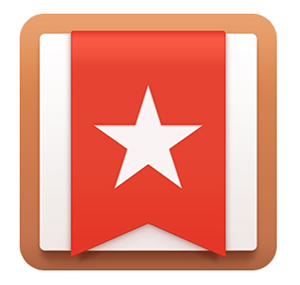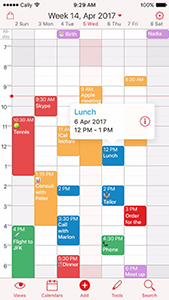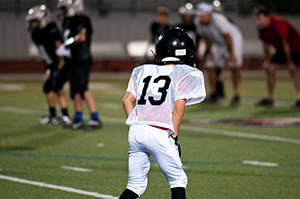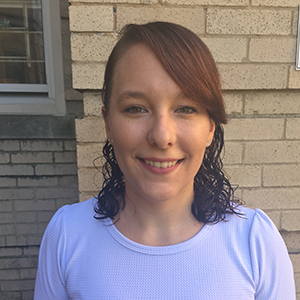DEALING WITH HEAD INJURIES

By Karen Jacobs & Mary McLean
Beep-Beep-Beep... An alarm sounds on Jenna’s iPad as it sits next to her while she works on a long-term assignment for her history class. She examines the screen of the device, which displays a notification entitled math homework. Jenna puts away her history assignment she has been working on and pulls out her math book to begin her homework. With this device, Jenna can manage her time to complete her academic work and dedicate an appropriate amount of time to each assignment.
After her concussion, while playing soccer last year, homework and time management has been a challenge for Jenna. This may sound like the day of a typical college student, but in reality, it is a student using an adaptive device to overcome the often-debilitating limitations caused by a Traumatic Brain Injury (TBI). This Cognitive Support Technology (CST) helps Jenna to support her goals of achieving an undergraduate education and a career in spite of her long-lasting traumatic brain injury symptoms.

LIFELONG EFFECTS
Jenna is among the approximately 1.7 million Americans who sustain a TBI annually. A TBI as it is often referred to is caused by trauma to the head which may damage the delicate structures of the brain. TBI can be caused by a variety of factors including car accidents, combat/improvised explosive devices (IED), sports, falling, and assaults or gunshots. The after effects of a TBI often do not end once the evidence of the initial trauma is healed. This injury can spur lifelong symptoms that include poor concentration, irritability, difficulty reading, and speaking. Very often fatigue, depression memory problems, anxiety and nervousness, sensitivity to light compound an already stressful situation. These symptoms can obviously cause challenges throughout many aspects of a person’s life. People who have had a TBI may often face a future with difficulties in achieving higher education, as well as obtaining and maintaining employment.
Like Jenna, individuals with a TBI can benefit from the use of CST such as an iPad and apps. There are a wide variety of app categories to address the challenges a person with a TBI faces.
• One category, Planning & Organization, has many apps such as Wunderlist, iOS and Week Calendar which allows for the person to converge their different schedules and assignments’ due dates into a single calendar. Another app in this category, 30/30 provides for the user to make a program of activities with notifications that allow for different intervals of time to be dedicated to each one. These apps implement a structured strategy for the organization that helps the person experiencing the effects of a TBI to remain focused.

• Another category of apps helps with taking notes in class and addresses the challenges of being a student with a TBI. An example of an app in this category is Notability which allows for users to draw onto images, insert recordings into notes, and write by hand or type. This kind of adaptation is essential to bring organization, usability, and focus on the often fast-paced task of taking notes during a lecture. Other apps, such as Dragon Dictation allows for users to turn their spoken words into text. For some students attending to the task of writing may be very difficult for them. An app such as Dragon Dictation allows for user to speak their ideas which are recorded. It will enable them to have a mode of exhibiting what they know on a topic even if they are unable to attend to the task of typing fast enough to record their ideas.
• Other app categories include Behavioral and Psychological Support/Relaxation. This category helps students address some of the behavior challenges such as managing stress. A specific app in this category is Breathe2Relax which primarily takes the user through different breathing exercises to mediate their mood. YogaStudio, another app is suitable for all abilities and includes quick yoga postures that can be customized to the individual’s routines.
• Finally, another category is Games and Activities that individuals can utilize that use games to develop and enhance memory skills. Some examples of these apps include Lumosity Brain Trainer and Elevate.
More app resources can be found at projectcareertbi.org.

TECHNOLOGY AT THE FOREFRONT
Responding to the serious public health concern in the United States regarding TBI, an inter-professional group from Kent State University, West Virginia University, and Boston University came together through a grant from the National Institute for Disability, Independent Living, Rehabilitation and Research (NIDILRR). Under the U.S. Department of Education to develop, it implements and demonstrates a technology-driven, long-term, and resource-rich individualized support program for undergraduate students with a TBI. This initiative is called Project Career, and it merges the use of CST and vocational rehabilitation (VR) practices to improve the career readiness and long-term employment outcomes of civilian and veteran post-secondary students with TBI. The Project Career attains this goal through psychometric evaluation of these students to ascertain their assistive technology, personal, academic, career objectives and needs. It also provides CST training, iPads, and apps; matches students with mentors in their area of work interest; offers vocational case management and job development and placement assistance; and provides an electronic portal regarding accommodation and career resources.
Jenna participated in Project Career and shared, “The reason I’m doing so well in my classes is because of Project Career.” As for Project Career outcomes, 74.9 percent of participants have reported doing better in school, and 62.2 percent indicated that their quality of life had been enhanced. Project Career has had a significant impact on these students’ lives. It is hoped that Project Career will serve as a guide to assist others with a TBI. The Project Career team is composed of Dr. Phillip Rumrill, Dr. Deborah J. Hendricks, Eileen Elias, Dr. Karen Jacobs, Anne Leopold, Amanda Nardone, Elaine Sampson, Deborah Minton and Dr. Marcia Scherer.
Case examples will be shared on Wednesday, November 15, 2017 from 1 to 2 PM (EST) at a complimentary Learn At WORK webinar titled Perceived Benefit of iPad Apps Among College Students With Traumatic Brain Injury. If you’re interested in joining, please register at attendee.gotowebinar.com/register/3415532095909897988.
If you miss attending webinar you can listen to recording on the Learn At WORK YouTube Channel, youtube.com/channel/UCOJalCXvSg9fPHaFFs48PuQ.

Mary McLean, BA, Occupational Therapy Doctoral (OTD) Student at Boston University, College of Health and Rehabilitation Sciences: Sargent College. Boston University’s Project Career team member.

Karen Jacobs, OT, OTR, EdD, CPE, Clinical Professor and Program Director, Online Post-professional Doctorate in Occupational Therapy (OTD) at Boston University, College of Health and Rehabilitation Sciences: Sargent College. She is the Boston University site coordinator for Project Career and can be contacted at kjacobs@bu.edu.




